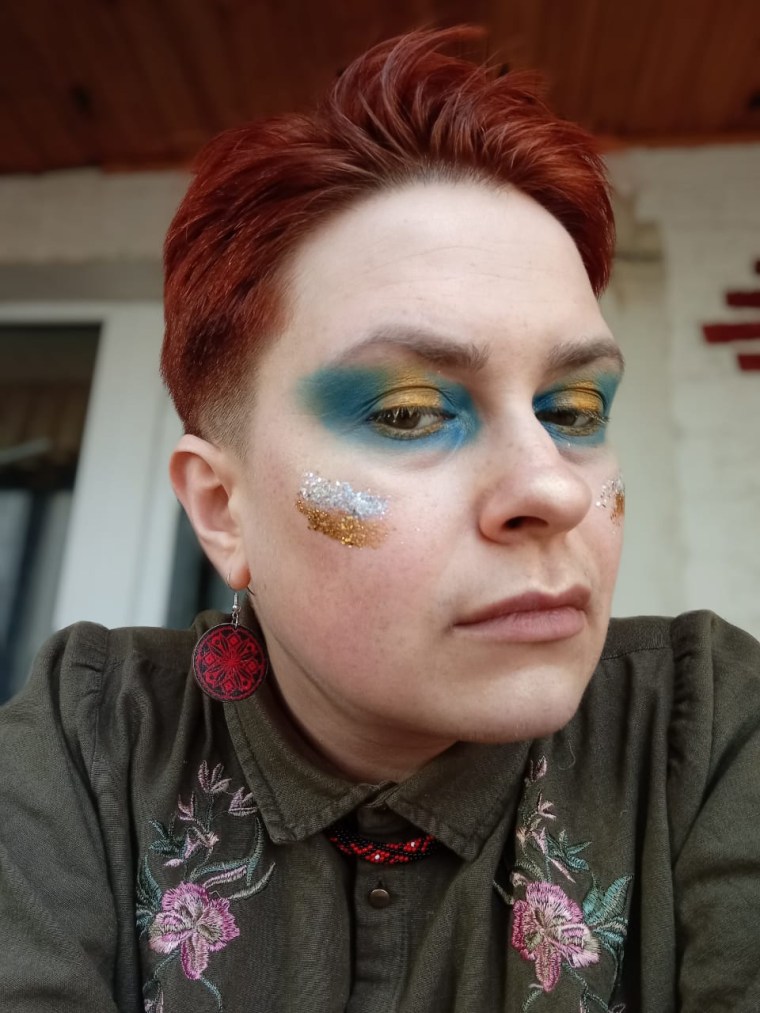Zi Faámelu woke up at 5:03 a.m. on Feb. 24 to the sound of loud booms outside her apartment in Kyiv.
“I looked at the window, and I saw the orange sky,” she said.
She called her friend, who was panicking. They both realized the war had started.
Faámelu, 31, decided to stay inside, where she felt it was safest. Soon her neighbors left, and she would, too, five days after Russia’s first attack on Ukraine. She began to run out of water and food, and her friend who worked at an LGBTQ organization called her with a warning.
“You have to leave here,” she said the friend urged. “You have to leave Kyiv, because there is a very dangerous group of [Ukrainian] transphobes and homophobes. They move around the city and hurt people like us.”
Faámelu is a transgender woman whose passport gender marker does not match her gender identity, which would make it difficult, if not impossible, to leave the country. With martial law having been declared in Ukraine, all able-bodied men ages 18 to 60 were required to stay and be available to join the army. Faámelu — who has lived as a woman for nearly a decade but whose passport still says male — would have to stay and potentially fight.
Living in ‘survival mode’
When Faámelu tried to change her identity documents in 2016, she was told she would have to stay in a psychiatric facility for a month for examinations and an official diagnosis. She chose not to, she said, because doing so would be “humiliating and demoralizing.” She also heard of other transgender women who had traumatizing experiences going through the process.
In the past, transgender people in Ukraine who wanted to legally change their gender markers on official documents had to go through extensive psychiatric observation and sterilization and undergo gender-reassignment surgery. In 2017, the process was revised, making it easier for trans people to align their documentation with their lived genders, according to Human Rights Watch.
While hospitalization in a psychiatric institution is no longer required, people still must receive official diagnoses of a “gender identity disorder,” such as “transsexualism,” to update their identity documents, according to the LGBTQ advocacy organization KyivPride.
Edward Reese, a project assistant at KyivPride, said the organization is working to improve transgender health care and update the country’s medical system. One of those updates would be to implement the newest edition of the International Classification of Diseases, which reclassifies transgender identities as “conditions related to sexual health,” instead of “mental and behavioural disorders.” The reclassification would make a psychiatric visit an unnecessary part of updating the gender marker on one’s identity documents.

Reese, 36, identifies as queer and nonbinary and uses he/him pronouns. He grew up in the central Ukrainian city of Dnipro and lived in Kyiv for three years. He fled to Denmark after the war started and is waiting for a temporary permit to live and work there.
He video blogs on TikTok, explaining LGBTQ issues such as nonbinary identities, queerness and intersectional feminism. But he has also received transphobic messages and death threats through the platform.
“It’s a normal issue for every LGBTQ activist in Ukraine, because we have some people who are deeply homophobic and transphobic,” he said.
Despite the online abuse, he said he sees progress in Ukraine and is optimistic about the country’s future, including the possibility of laws being passed that prohibit hate speech and strictly penalize hate crimes.
“Ukraine is quite a modern country. Human rights is really high — not perfect, but high,” he said. “Definitely, we have some transphobia and some homophobia, which is mostly because of lack of education.”
Faámelu, however, is not as optimistic. She came out as transgender in 2014, and since then, she said, she has become estranged from her parents and experienced consistent discrimination. She loves her country but said the transphobia there is brutal.
“You’re in danger everywhere, because people beat you in the streets, and they’ve beaten me one time in the streets,” she said. “I know there is, like, LGBTQ+ organizations in Ukraine. They want to paint a good picture about Ukraine and this community, but it’s not true. This is the harsh reality and truth. So we’ll always have to live in a survival mode.”
Faámelu is a well-known singer in Ukraine, having competed on the singing show “Star Factory” in 2017. With the fame, however, came increased pain, having to constantly prove she is a woman, she said.
“They never use ‘transgender.’ They never use ‘transexual.’ They always use ‘transvestite.’ The Ukrainian people and Russian people and Belarus people,” she said. “We don’t have laws that protect us. We don’t have our rights. So we’re just invisible.”
The International Lesbian, Gay, Bisexual, Trans and Intersex Association ranked Ukraine 39th in its LGBTQ human rights ranking of 49 European countries. Belarus came in at 44, while Russia ranked 46.
A daring escape
On Feb. 28, Faámelu got in touch with a former colleague who agreed to drive her from Kyiv to Chernivtsi, a Ukrainian city about 40 miles from the Romanian border. They left the next day.
At every roadblock, she said, her passport was questioned and photos were taken of it and of her. At the first checkpoint, at the border of Porubne, Ukraine, and Siret, Romania, she was detained, her passport was taken, and she was refused a lawyer, she said. She was finally let go when a female customs officer told the guards they did not have the right to detain her.
After being denied passage, Faámelu stayed overnight in a cafe at the Porubne-Siret border. Through the help of friends in Germany, a Romanian driver was sent there to take her to another checkpoint. They tried bribing the police officer stationed at the checkpoint 3,000 euros to pass through, but it did not work. He recognized her from the photos taken and shared by the other guards, she said. He then took her by force to the military enforcement office, where, she said, officers were laughing at her and calling her homophobic slurs.
She was deemed eligible to join the army, but she needed to go to a hospital for a medical check before she could enlist. The hospitals were unable to check her that day, so the guards reluctantly let her go and told her she had to return in the morning.
“I didn’t want to kill people,” Faámelu said at the thought of going to war.
She went back to the car, where the driver was waiting for her, and told him what happened.
“He looked at me and said, ‘Can you swim?’” He told her the only way left was to swim across a short stretch of the Danube River, she recalled. “I couldn’t believe that it was really happening to me.”

He drove her there. She put her Ukrainian ID, her passport and her phone in a plastic bag in her bra. As they started walking toward the spot, two military men started moving toward them, pointing a gun at Faámelu.
“They said, ‘Zi, are you ready to die tonight?’” she said.
Faámelu took off running and heard the driver behind her yelling out in pain as the men started to attack him.
“I felt like a criminal, like I’m doing something wrong,” she said. “Yes, I was breaking the law, but I was a refugee, and I am a refugee.”
She swam across the river, fighting strong currents and using every last bit of her energy, she said. When she made it to the other side, she saw 10 military vehicles on the Ukrainian side. The Romanian police drove her to the police station, where she was given dry clothes and food. The next morning, they returned her IDs and phone and had her sign some documents. She was taken to a refugee camp, and from there, they took her to Germany.

Zi Faámelu
While the war has created a devastating humanitarian crisis and has forced millions of Ukrainians to flee their homes, transgender refugees, like Faámelu, face an added layer of danger and uncertainty, said Aaron Morris, the executive director of Immigration Equality, an LGBTQ immigrant rights organization.
“They often pass through other nations that are not safe, too, before they reach a place where they might claim refugee or asylum status,” Morris said. “Every time they pass a checkpoint, they’re scrutinized, and each new government makes their own determination about the validity of their documents.”
A report released last year by the United Nations Refugee Agency found that displaced LGBTQ people “frequently experience continued harm” as they flee emergency situations in their home countries, while in transit to new destinations and upon arrival in places of asylum. The harm, the report found, includes stigmatization, sexual violence, arbitrary detention and exclusion from access to essential services.
“LGBTIQ+ refugees, asylum seekers and internally displaced people can often end up in a similar or worse situation than the one they fled from,” Kathryn Mahoney, a spokesperson for the U.N. Refugee Agency, said in an email. “The already severe protection risks they experience due to their sexual orientation, gender identity, gender expression or sex characteristics in their country of origin are often exacerbated by anti-LGBTIQ+, xenophobic and racist attitudes in a country of asylum, including from other refugees.”
She added: “Trans women do continue to arrive in countries neighboring Ukraine. We know that some have crossed through unofficial border points to avoid authorities.”
A chance to ‘start again’
After she arrived in Germany, Faámelu was taken in by a kind family, and she said she is restarting her life.
“The only thing I have left is my voice and my story, and I’m trying to raise awareness and visibility for trans communities all over the world,” she said. “I think it’s important to speak up even though this story is very different from others, because I’m telling the harsh reality, the truth of what’s going on there.”

Courtesy Zi Faámelu
Faámelu has heard of other transgender people who escaped through the mountains, the woods and the river, as well, some of whom have been able to leave using fake IDs, she said.
She now plans to help change laws pertaining to transgender people in Germany, which is ranked 15th on the International Lesbian, Gay, Bisexual, Trans and Intersex Association’s LGBTQ list. On her list is to update the country’s Transsexual Law, which regulates name changes and gender markers on official documents if people do not identify with the names or genders they were assigned at birth.
“I want to continue with my activism, and maybe as a musician, as an artist, I can somehow start again,” she said.









Recent Comments